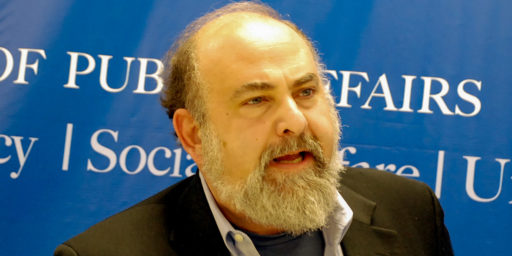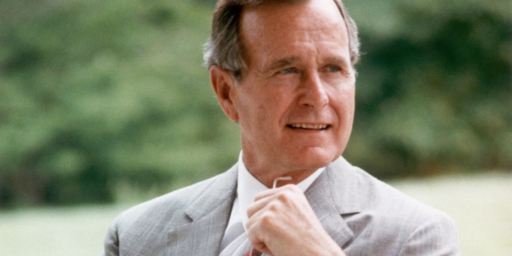Obama and Clinton Foreign Policies
Kevin Drum thinks the recent “cage match” between Barack Obama and Hillary Clinton on foreign policy reveals “just how little difference there really is between the two.”
As Dave Schuler pointed out Wednesday evening on OTB Radio, this is generally true about American foreign policy, even across party lines. While there have been significant differences in style, there hasn’t been that much substantive policy shift from LBJ to Nixon to Ford to Reagan to Bush 41 to WJ Clinton to Bush 43. The omitted Carter, a true idealist, being the sole exception.
Mark Kleiman, though, contends Obama represents a legitimate, not merely rhetorical, shift.
HRC thinks we ought to go back to Bill Clinton’s foreign policy. Obama doesn’t.
Obama is rejecting the “our sunuvabitch” strategy of making nice to Musharraf (and, I think, the House of Saud as well). HRC says that’s “naive” and “irresponsible.”
Kleiman argues that Hillary is winning this one because it plays well into her “Obama is too inexperienced to be president” mantra, even though his positions make more sense:
http://www.samefacts.com/cgi-bin/mt/mt-t.cgi/4062If HRC was the media stepchild instead of Obama, she’d be in an impossible position on this one, because her stance is so internally contradictory. She’s insisting that it would be “irresponsible” to attack al-Qaeda bases in Pakistan, and at the same time inisting that the use of nuclear weapons should be on the table as part of the attacks she doesn’t want to carry out. But instead it’s Obama’s competence that’s being called into question. Who said life was fair?
Ezra Klein also believes the differences are real, with their staffs and policy stances indicating that Clinton is a hawk while Obama is a dove. Moreover,
Their positions on the Iraq War, for instance, are very different. Obama believes we shouldn’t have gone in. Even if there were weapons. Clinton believes we were wrong about the weapons, but that she did, at the time, vote correctly on sending us to war. So she believes the war was fundamentally right, while he believes it was fundamentally wrong.
Kleiman and Klein are both right: The differences are real, at least on the campaign trail. Whether the foreign policy of an actual President Obama would be substantially different from an actual President HR Clinton, though, is another matter. For a variety of reasons (also laid out in the show) presidents tend to adopt foreign policies very much like their predecessors when they assume office. Things just look different when you’re in the captain’s chair rather than operating in the world of theory.
Obama advisor Samantha Power agrees but argues it’s time for that to change.
It was Washington’s conventional wisdom that led us into the worst strategic blunder in the history of US foreign policy. The rush to invade Iraq was a position advocated by not only the Bush Administration, but also by editorial pages, the foreign policy establishment of both parties, and majorities in both houses of Congress. Those who opposed the war were often labeled weak, inexperienced, and even naïve.
Barack Obama defied conventional wisdom and opposed invading Iraq. He did so at a time when some told him that doing so would doom his political future. He took that risk because he thought it essential that the United States “finish the fight with bin Laden and al Qaeda.” He warned that a “dumb war, a rash war” in Iraq would result in an “occupation of undetermined length, at undetermined cost, with undetermined consequences.”
Barack Obama was right; the conventional wisdom was wrong. And today, we see the consequences. Iraq is in chaos. According to the National Intelligence Estimate, the threat to our homeland from terrorist groups is “persistent and evolving.” Al-Qaeda has a safe-haven in Pakistan. Iran has only grown stronger and bolder. The American people are less safe because of a rash war.
Over the last few weeks, Barack Obama has once again taken positions that challenge Washington’s conventional wisdom on foreign policy. And once again, pundits and politicians have leveled charges that are now bankrupt of credibility and devoid of the new ideas that the American people desperately want.
On each point in the last few weeks, Barack Obama has called for a break from a broken way of doing things. On each point, he has brought fresh strategic thinking and common sense that break with the very conventional wisdom that has led us into Iraq.
During the 1992 presidential debates, Ross Perot responded to a question suggestion he didn’t have the preparation that his opponents had and he agreed, responding, “I don’t have any experience screwing up the country.” It may well be that Obama’s relative lack of Washington experience has sufficiently insulated him from the Foreign Policy Establishment that he would represent a bold break, for good or ill. On the other hand, history has shown that those who come to the presidency without a foreign affairs background (which is to say, virtually all of them) quickly get caught up in the Conventional Wisdom of the greybeards.






I suspect that actual presidents adopt a foreign policy similar to their predessors largely because of what they learn things from their various in briefings (intelligence, defense, state) that most people just don’t know.
Quite right. Then again, much of what they “learn” is filtered through a set of institutional preferences that perpetuate doing things the way we always have. But it’s incredibly risky for a president, especially one whose experience is primarily domestic affairs, to buck the advise of the “experts.”
True. Lets just hope the experts aren’t agenda driven.
I’m sorry, but you lost me when they said that Obama’s position to abandon the fight against AQ in Iraq, then unilaterally invade a putative ally who has nuclear weapons to chase AQ there followed by saying under no circumstances would he use nuclear weapons (such as perhaps when we get nuked by the radical islamist country who took over the nukes after we invaded and then pulled out because an American soldier was killed thus creating a quagmire we had to run away from), makes sense.